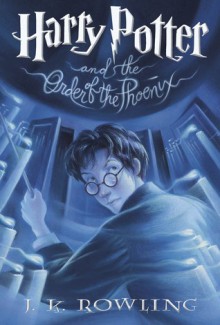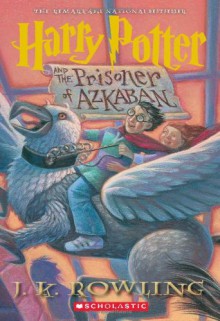
Whew! After two months and 4,100 pages, I have finished Litchick's Epic Harry Potter Group Read! It was fun, but I confess to suffering from HP fatigue by the end. -Or maybe it only felt that way because Deathly Hallows drags so much in the middle, what with the hundreds of pages of wandering and camping.
Deathly Hallows is a hard book to rate and review. Like many war stories, the losses come so fast and furious it's hard to tally the casualties until it's all over. (For example, I never noticed before in my grief over
the sudden loss of Hedwig
that Harry loses his Firebolt at the same time. Yes, it's "just a broomstick," not a living thing, but it was a gift from Sirius and definitely had sentimental value, and yet Harry never has a chance to mourn its loss.) The death toll is staggering, and the reader (and Harry et al) have time to process only some of the casualties
(Hedwig, Mad-Eye, Dobby)
, while others are cruelly, suddenly consumed by the carnage of the final battle
(Fred, Lupin and Tonks, Colin Creevey)
.
The overarching message of Deathly Hallows (and, indeed, the whole series) seems to be that no one is wholly good or wholly bad, and that there is always the possibility of redemption. Just as it is possible, up until the last moment, for Voldemort to repent his evil deeds and repair his broken soul, the Deathly Hallows is full of examples of "bad" characters being (at least partially) redeemed. The most obvious of these is Professor Snape's story (I won't spoil the details for newbies, but I will say that in my opinion his redemption doesn't make up for all of the child-hating malice that came before), but there are countless smaller, more subtle moments, too: Dudley Dursley, worrying over Harry's safety when he learns Harry won't be joining the family in hiding; Draco Malfoy, feigning an inability to recognize Harry when the Snatchers brought him to Malfoy Manor; Peter Pettigrew's predicted (but sadly self-defeating) impulse toward mercy; Narcissa Malfoy's terrified, self-serving, but brave lie to Voldemort in the Forbidden Forest; Kreature leading the House-Elf charge in the Battle of Hogwarts. Conversely, there are also "good" people who do terrible things under pressure: Lupin, terrified of the pressures of fatherhood, tempted to abandon his wife and child; Xeno Lovegood, betraying Harry out of fear for his daughter; Dumbledore, whose youthful hunger for notoriety contributed to his sister's death, and whose epic lie of omission (discovered only postumously) casts a pall over his entire mentorship of Harry. Even Harry, who is so good, so forgiving, learns that he has evil within, and he must sacrifice to purge it (and the scene where he walks into the Forest to do it never ceases to slay me, and I believe it may be the most emotionally-wrenching scene I've ever read in any book, ever.)
Parts of Deathly Hallows annoy me. I keep harping on the interminably boring camping section, and while I understand the narrative purpose of that section -- it's allegorical, like Jesus wandering the wilderness for 40 days to be tempted by the devil, the slow progress of the quest to gather and destroy horcruxes is part of the test of the three friends' characters, especially Ron's -- it still bogs down the story. I also remember how disgusted some Harry Potter fans were at the epilogue when Deathly Hallows first came out, and I agree: the epilogue is frustrating, even trite, in its perky brevity. On the other hand, I also firmly believe that there was no way to end this series without disappointing fans: the very fact that Harry Potter's quest ended at all was always going to be a crushing letdown to a generation of readers who grew up with their imaginations immersed in the Potterverse. I hate the epilogue, but I was going to hate the end of this series no matter how J.K. Rowling did it, simply because it had to end.
Even with these complaints, I admire Deathly Hallows for bringing an intensely complicated, layered plot to a satisfying emotional conclusion. The loose ends of the quest to defeat Voldemort and the threads of the many, many subplots were all woven together in an impressively detailed tapestry of story that remains as engrossing years later, after several re-reads, as it was in 1998 when I first picked up Harry Potter and the Sorcerer's Stone.

 Log in with Facebook
Log in with Facebook 









